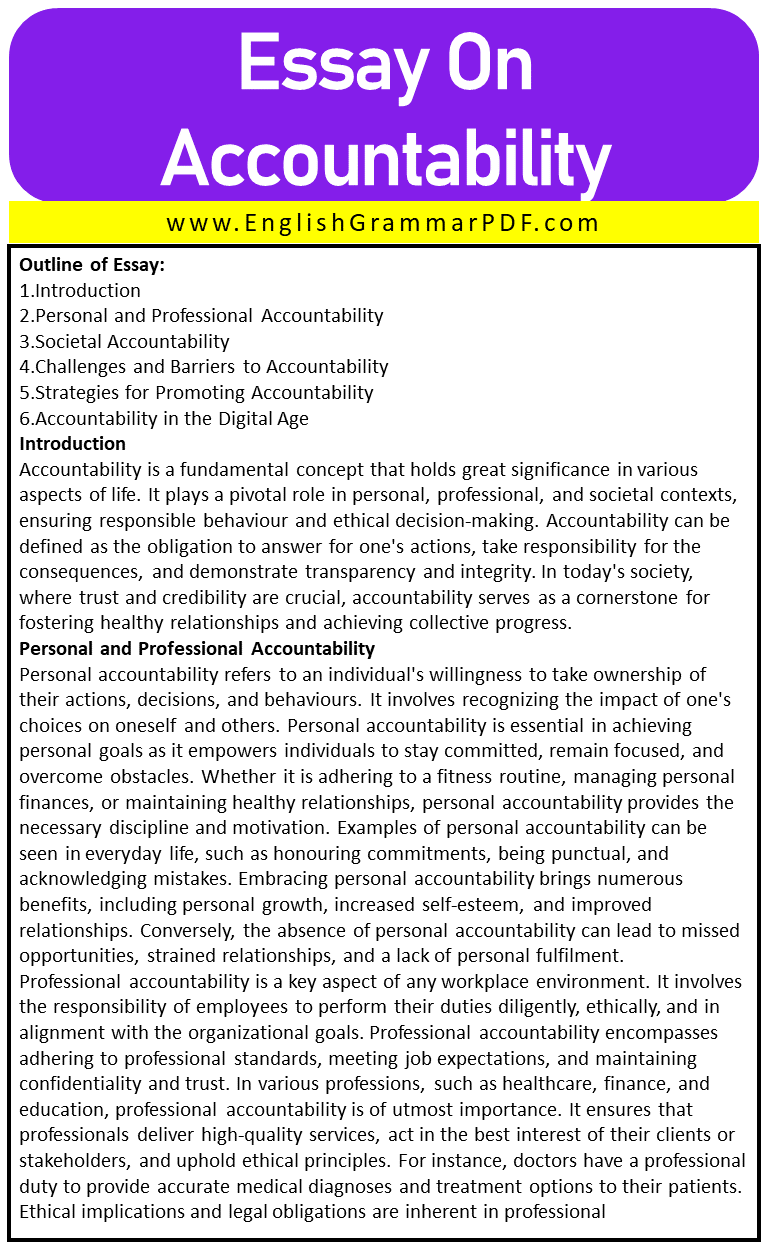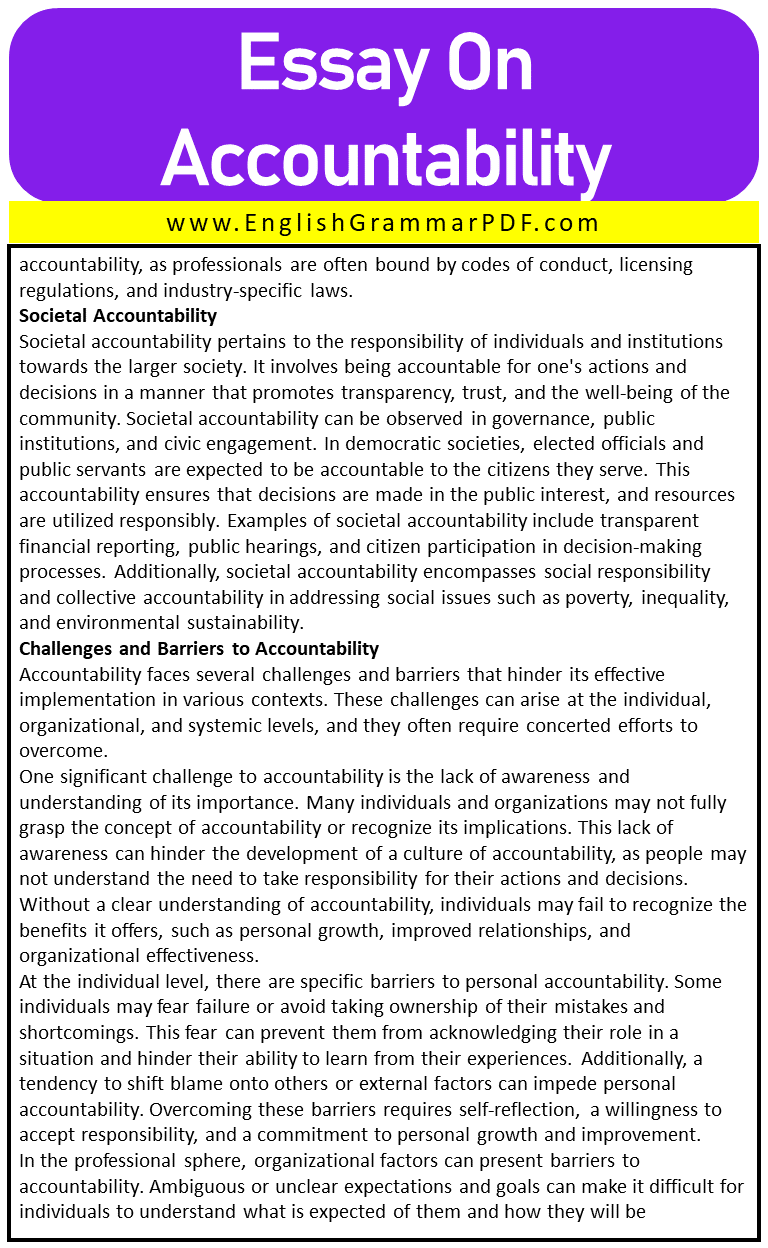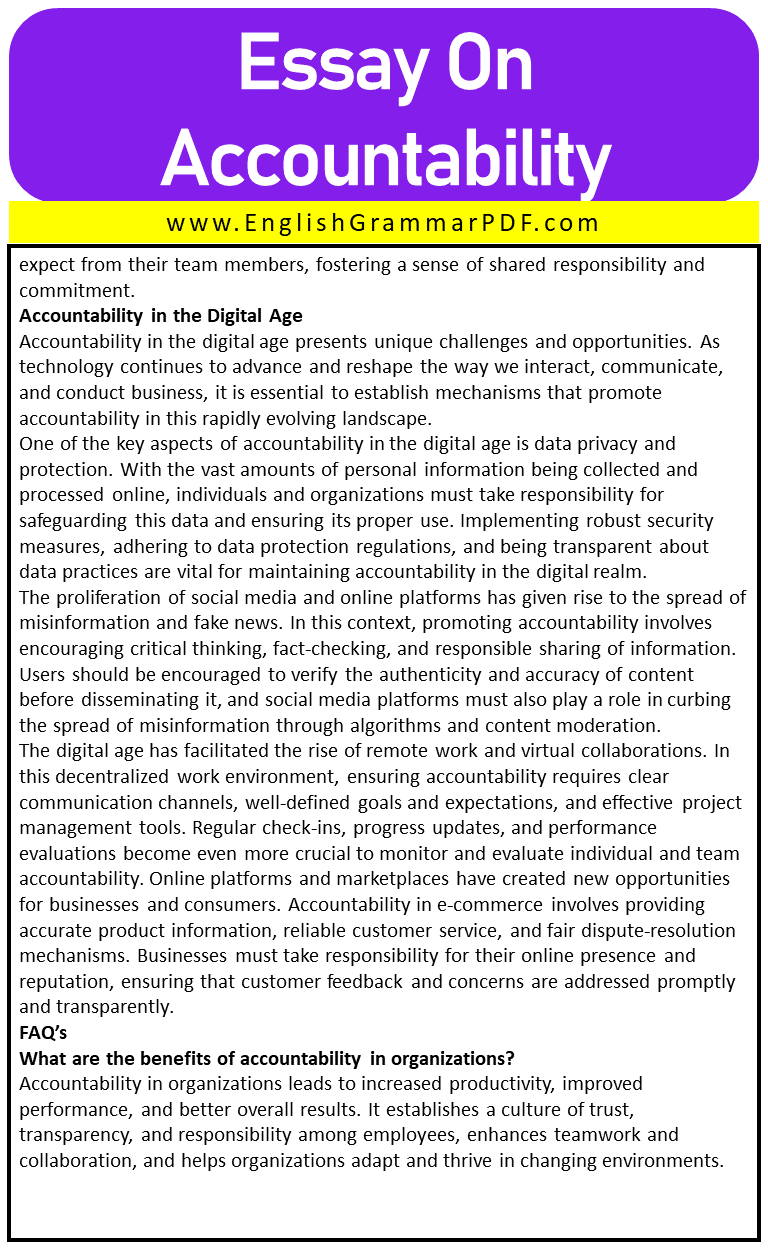Essay On Accountability
Outline of Essay:
- Introduction
- Personal and Professional Accountability
- Societal Accountability
- Challenges and Barriers to Accountability
- Strategies for Promoting Accountability
- Accountability in the Digital Age
Introduction
Accountability is a fundamental concept that holds great significance in various aspects of life. It plays a pivotal role in personal, professional, and societal contexts, ensuring responsible behaviour and ethical decision-making. Accountability can be defined as the obligation to answer for one’s actions, take responsibility for the consequences, and demonstrate transparency and integrity. In today’s society, where trust and credibility are crucial, accountability serves as a cornerstone for fostering healthy relationships and achieving collective progress.
Personal and Professional Accountability
Personal accountability refers to an individual’s willingness to take ownership of their actions, decisions, and behaviours. It involves recognizing the impact of one’s choices on oneself and others. Personal accountability is essential in achieving personal goals as it empowers individuals to stay committed, remain focused, and overcome obstacles. Whether it is adhering to a fitness routine, managing personal finances, or maintaining healthy relationships, personal accountability provides the necessary discipline and motivation. Examples of personal accountability can be seen in everyday life, such as honouring commitments, being punctual, and acknowledging mistakes. Embracing personal accountability brings numerous benefits, including personal growth, increased self-esteem, and improved relationships. Conversely, the absence of personal accountability can lead to missed opportunities, strained relationships, and a lack of personal fulfilment.
Professional accountability is a key aspect of any workplace environment. It involves the responsibility of employees to perform their duties diligently, ethically, and in alignment with the organizational goals. Professional accountability encompasses adhering to professional standards, meeting job expectations, and maintaining confidentiality and trust. In various professions, such as healthcare, finance, and education, professional accountability is of utmost importance. It ensures that professionals deliver high-quality services, act in the best interest of their clients or stakeholders, and uphold ethical principles. For instance, doctors have a professional duty to provide accurate medical diagnoses and treatment options to their patients. Ethical implications and legal obligations are inherent in professional accountability, as professionals are often bound by codes of conduct, licensing regulations, and industry-specific laws.
Societal Accountability
Societal accountability pertains to the responsibility of individuals and institutions towards the larger society. It involves being accountable for one’s actions and decisions in a manner that promotes transparency, trust, and the well-being of the community. Societal accountability can be observed in governance, public institutions, and civic engagement. In democratic societies, elected officials and public servants are expected to be accountable to the citizens they serve. This accountability ensures that decisions are made in the public interest, and resources are utilized responsibly. Examples of societal accountability include transparent financial reporting, public hearings, and citizen participation in decision-making processes. Additionally, societal accountability encompasses social responsibility and collective accountability in addressing social issues such as poverty, inequality, and environmental sustainability.
Challenges and Barriers to Accountability
Accountability faces several challenges and barriers that hinder its effective implementation in various contexts. These challenges can arise at the individual, organizational, and systemic levels, and they often require concerted efforts to overcome.
One significant challenge to accountability is the lack of awareness and understanding of its importance. Many individuals and organizations may not fully grasp the concept of accountability or recognize its implications. This lack of awareness can hinder the development of a culture of accountability, as people may not understand the need to take responsibility for their actions and decisions. Without a clear understanding of accountability, individuals may fail to recognize the benefits it offers, such as personal growth, improved relationships, and organizational effectiveness.
At the individual level, there are specific barriers to personal accountability. Some individuals may fear failure or avoid taking ownership of their mistakes and shortcomings. This fear can prevent them from acknowledging their role in a situation and hinder their ability to learn from their experiences. Additionally, a tendency to shift blame onto others or external factors can impede personal accountability. Overcoming these barriers requires self-reflection, a willingness to accept responsibility, and a commitment to personal growth and improvement.
In the professional sphere, organizational factors can present barriers to accountability. Ambiguous or unclear expectations and goals can make it difficult for individuals to understand what is expected of them and how they will be held accountable. Poor leadership, including a lack of role models or a culture that tolerates unethical bbehaviour can undermine accountability within an organization. To overcome these barriers, organizations need to establish clear expectations, provide necessary support and resources, promote ethical behaviour, and hold individuals accountable for their actions.
Systemic challenges also pose significant barriers to accountability. In some cases, complex power structures and hierarchies can make it difficult to hold individuals or institutions accountable for their actions. Corruption and lack of transparency in governance systems can undermine accountability mechanisms. Overcoming systemic challenges requires strengthening legal and regulatory frameworks, promoting transparency, and fostering a culture of accountability throughout society.
Strategies for Promoting Accountability
Promoting accountability is crucial for fostering a culture of responsibility, integrity, and transparency within organizations and society as a whole. By implementing effective strategies, individuals and institutions can ensure that actions have consequences and that everyone is held responsible for their commitments and duties. Here are some key strategies for promoting accountability.
Clear expectations and goals must be established. By clearly defining roles, responsibilities, and performance objectives, individuals have a clear understanding of what is expected of them. This clarity sets the foundation for accountability, as it leaves no room for ambiguity or excuses. Regular communication and feedback are essential. By providing timely and constructive feedback, managers and leaders can keep individuals accountable for their performance and behaviour. It is important to create an environment where open and honest communication is encouraged, allowing individuals to address challenges and seek guidance when needed.
Accountability can be enhanced through transparency. Openly sharing information, decision-making processes, and outcomes ensures that individuals are aware of the reasons behind certain actions and can evaluate their impact. Transparency builds trust and enables individuals to hold others accountable, including those in positions of authority. Consequences and rewards must be aligned with performance. By implementing a fair and consistent system of consequences, individuals understand that their actions have repercussions. At the same time, recognizing and rewarding achievements and exemplary behaviour reinforces a culture of accountability and motivates individuals to perform at their best.
Lastly, leading by example is crucial. When leaders and authority figures demonstrate accountability in their actions, they set a powerful precedent for others to follow. Leaders must hold themselves to the same standards they expect from their team members, fostering a sense of shared responsibility and commitment.
Accountability in the Digital Age
Accountability in the digital age presents unique challenges and opportunities. As technology continues to advance and reshape the way we interact, communicate, and conduct business, it is essential to establish mechanisms that promote accountability in this rapidly evolving landscape.
One of the key aspects of accountability in the digital age is data privacy and protection. With the vast amounts of personal information being collected and processed online, individuals and organizations must take responsibility for safeguarding this data and ensuring its proper use. Implementing robust security measures, adhering to data protection regulations, and being transparent about data practices are vital for maintaining accountability in the digital realm.
The proliferation of social media and online platforms has given rise to the spread of misinformation and fake news. In this context, promoting accountability involves encouraging critical thinking, fact-checking, and responsible sharing of information. Users should be encouraged to verify the authenticity and accuracy of content before disseminating it, and social media platforms must also play a role in curbing the spread of misinformation through algorithms and content moderation.
The digital age has facilitated the rise of remote work and virtual collaborations. In this decentralized work environment, ensuring accountability requires clear communication channels, well-defined goals and expectations, and effective project management tools. Regular check-ins, progress updates, and performance evaluations become even more crucial to monitor and evaluate individual and team accountability. Online platforms and marketplaces have created new opportunities for businesses and consumers. Accountability in e-commerce involves providing accurate product information, reliable customer service, and fair dispute-resolution mechanisms. Businesses must take responsibility for their online presence and reputation, ensuring that customer feedback and concerns are addressed promptly and transparently.
FAQ’s
What are the benefits of accountability in organizations?
Accountability in organizations leads to increased productivity, improved performance, and better overall results. It establishes a culture of trust, transparency, and responsibility among employees, enhances teamwork and collaboration, and helps organizations adapt and thrive in changing environments.
How can accountability be maintained over time?
To maintain accountability over time, it is important to regularly assess progress, review goals, and adjust strategies if needed. Continual communication, feedback, and reinforcement of expectations contribute to sustaining accountability. Periodically evaluating and refining processes and systems can help identify and address any potential gaps in accountability.
Explore More Essays:
Download the PDF of the Essay:







